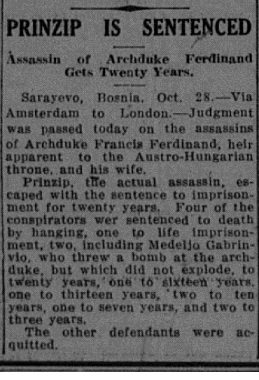by Richard van Pelt, WWI Correspondent
In the eyes of many, the assassination of the Archduke Ferdinand set in motion the events that led to war. Readers of the Statesman saw the following in their edition of the October 29, 1914:
 In the previous day’s edition, the editor published the following editorial, entitled “That Bosnian Lynching Bee:
In the previous day’s edition, the editor published the following editorial, entitled “That Bosnian Lynching Bee:
The Austrian courts at Sarajevo in Bosnia, have just convicted the twenty-five man and boys charged with the assassination of Archduke Ferdinand and his wife. The case will attract little attention. It is of interest chiefly because it indicates with what sanity and safety that historic tragedy might be been handled, if the Austrian government had not lost its head and tried to lynch the Serbian nation for the crime.
If Austria had been content from the first with the legal course she is now pursuing, there would not be 20,000,000 men in arms today. There would not be 1,000,000, or more, young men dead, wounded or captured by the enemy. The homes of the people of seven nations would not be hung with crepe. Belgium, Galicia, East Prussia and Russian Poland would not be laid wast. Three million wretched fugitives would be living contentedly in their homes. An impoverished continent would not be looking forward to a winter of hunger and horror. Disinterested strangers would not be murdering each other in China and Africa and the open seas. Several billion dollars’ worth of property would not have been destroyed. The commerce and finance of the world would not have been upset. The United States would be enjoying a wave of prosperity. Several hundred million people scattered all through every country on the globe would not have their means of living interfered with, their comforts and even their necessities cut off, and their prospects made hopeless.
Yes, the human race is paying for Austria’s attempted lynching bee. And if we feel disposed to bitterness, let us remember in charity that Austria herself is paying the heaviest penalty for all for her own lawlessness.
From a century distant, the conclusion rings with poignancy and a large measure of truth.







Leave A Comment